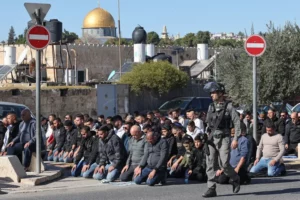Islamic community leaders in the UK and the US urge Obama to stop force-feeding Guantanamo prison detainees during the holy month of Ramadan
by Syarif Hidayat*
 The double standards of the renowned world preacher of human rights and the hypocrisy of US imperialism’s pretense of promoting human rights on the world arena is demonstrated in Washington’s decision to maintain Guantanamo prison and torture camps. President Barack Obama had decided to give $50 million to keep Guantanamo open indefinitely in a gross violation of his election promise. President Obama promised to close Guantanamo as part of his election campaign in 2008. Islamic community leaders in the UK and the US urge Obama to stop force-feeding Gitmo detainees during Ramadan.
The double standards of the renowned world preacher of human rights and the hypocrisy of US imperialism’s pretense of promoting human rights on the world arena is demonstrated in Washington’s decision to maintain Guantanamo prison and torture camps. President Barack Obama had decided to give $50 million to keep Guantanamo open indefinitely in a gross violation of his election promise. President Obama promised to close Guantanamo as part of his election campaign in 2008. Islamic community leaders in the UK and the US urge Obama to stop force-feeding Gitmo detainees during Ramadan.
“Anywhere that human rights are under threat, the United States will proudly stand up, unabashedly, and continue to promote greater freedom, greater openness, and greater opportunity for all people. And that means speaking up when those rights are imperiled. It means providing support and training to those who are risking their lives every day so that their children can enjoy more freedom. It means engaging governments at the highest levels and pushing them to live up to their obligations to do right by their people.” – Secretary of State John Kerry, April 2013.
Also Read: Boycott of Zionism, The Most Powerful Weapon
Every year, the U.S. State Department releases a report on the status of human rights in countries around the world. Every year, one country is notably missing from this report — the United States.
“Our world is complex and increasingly influenced by non-state actors – brave civil society activists and advocates, but also violent extremists, transnational criminals, and other malevolent actors. In those places where human rights and fundamental freedoms are denied, it is far easier for these negative destabilizing influences to take hold, threatening international stability and our own national security.”
“It is in our interest to promote the universal rights of all persons. Governments that respect human rights are more peaceful and more prosperous. They are better neighbors, stronger allies, and better economic partners. Governments that enforce safe workplaces, prohibit exploitative child and forced labor, and educate their citizens create a more level playing field and broader customer base for the global marketplace. Conversely, governments that threaten regional and global peace, from Iran to North Korea, are also egregious human rights abusers, with citizens trapped in the grip of domestic repression, economic deprivation, and international isolation.”
“The United States stands with people and governments that aspire to freedom and democracy, mindful from our own experience that the work of building a more perfect union – a sustainable and durable democracy – will never be complete. As part of this commitment, we advocate around the world for governments to adopt policies and practices that respect human rights regardless of ethnicity, religion, gender, race, sexual orientation, or disability; that allow for and honor the results of free and fair elections; that ensure safe and healthy workplaces; and that respect peaceful protests and other forms of dissent. The United States continues to speak out unequivocally on behalf of the fundamental dignity and equality of all persons.” – Secretary of State John F. Kerry’s Preface on the Department of State’s Country Reports on Human Rights Practices for 2012.
Also Read: Nuclear Technology: Harm and Benefit from the Qur’anic Perspective
The international organization Human Rights Watch has said that the US is “hypocritical” when it criticizes other countries for violating human rights, because the situation in the US itself is far from perfect. Deputy Director of the Europe and Central Asia Division of Human Rights Watch Rachel Denber criticized Obama’s administration for not investigating into cases of torture in prisons under Bush the junior and in Guantanamo prison.
America’s human rights hypocrisy
 The human rights record of the United States was put under an international microscope, as the UN Human Rights Council issued 228 recommendations on how Washington can address violations. America has long been the self appointed global leader on human rights, pointing out the shortcomings of others. But now the tables have turned. According to the United Nations Human Rights Council, incidents of injustice are taking place on US soil.
The human rights record of the United States was put under an international microscope, as the UN Human Rights Council issued 228 recommendations on how Washington can address violations. America has long been the self appointed global leader on human rights, pointing out the shortcomings of others. But now the tables have turned. According to the United Nations Human Rights Council, incidents of injustice are taking place on US soil.
Also Read: Gaza Cries Out, the World Stays Silent: A Wounded Humanity
The point was made in Geneva, Switzerland at the Human Rights Council’s first comprehensive review of Washington’s record. The council released a Universal Periodic Review Tuesday, listing 228 recommendations on how the US can do better. “Close Guantanamo and secret detention centers throughout the world, punish those people who torture, disappear and execute detainees arbitrarily,” said Venezuelan delegate German Mundarain Hernan. The US has dismissed many recommendations calling them political provocations by hostile countries.
Yet even America’s allies are highlighting grave flaws. France and Ireland are demanding Obama follow through on the promise to close Guantanamo Bay. Britain, Belgium and dozens of others have called on the US to abolish the death penalty. For many, it’s the ultimate hypocrisy. How can a state with roughly 3,000 people on death row lecture the world about humanity? Many say the prime example is Mumia abu Jamal, viewed by some as America’s very own political prisoner.
“The United States, the perpetrator of gross human right violations is using human rights as a political football against its enemies. Its enemies are not enemies because they violate human rights necessarily, but because the US wants to change the government in their country,” said Brian Becker, Director of A.N.S.W.E.R Coalition in Washington, DC. The country often criticizing adversaries like Syria, Iran and North Korea for oppressing its citizens, is now faced with defending domestic practices like indefinite detention, poor prison conditions, and racial profiling.
America is home to the world’s largest prison population, with 2.3 million people currently behind bars. Children can be sentenced to life in prison and more than 100 undocumented immigrants have died behind bars while awaiting deportation from the US. Increasing discrimination against Muslims has become another blemish on America’s human rights record. Hundreds have been arrested in so-called FBI foiled terror plots involving government paid informants accused of manufacturing and setting up the crime. It is a practice other countries term entrapment.
Also Read: Indo Defence Expo and Forum; Sharing Responsibility of Humankind and Environment
Islamic leaders urge Obama to stop force-feeding Gitmo detainees during Ramadan
(The Chair for forced-feeding: The 23 force-fed prisoners are strapped into chairs like this one, described by manufacturers as ‘padded cells on wheels’).
 Islamic community leaders in the UK and the US have called on the US president to end force-feeding of prisoners in Guantánamo and “fulfill his promise to shut down” the prison, which is “un-American” and “against every international legal norm.” This will be the twelfth year for some inmates who are observing Ramadan at Guantanamo. However, this time the situation has been dramatically aggravated by the mandatory force-feeding. Refusing to suspend the practice during the central religious holiday, the US is hurting the feelings and religious beliefs of the Muslims, activists say.
Islamic community leaders in the UK and the US have called on the US president to end force-feeding of prisoners in Guantánamo and “fulfill his promise to shut down” the prison, which is “un-American” and “against every international legal norm.” This will be the twelfth year for some inmates who are observing Ramadan at Guantanamo. However, this time the situation has been dramatically aggravated by the mandatory force-feeding. Refusing to suspend the practice during the central religious holiday, the US is hurting the feelings and religious beliefs of the Muslims, activists say.
Also Read: Safiya Saeed: From Somali Migrant to First Hijab-Wearing Mayor of Sheffield
“Our position has always been that it’s wrong to force feed detainees, that’s the position of international legal experts, it’s the position of medical ethicists, it’s the position of every right-thinking person who doesn’t want to see detainees abused in this way, whether you do it in daylight hours or after sunset, wrong is wrong,” a spokesman of the largest US Muslim civil rights and advocacy group, the Council On American-Islamic Relations (CAIR) told RT.
“What we’d like to see is for President Obama to fulfill his promise to shut down Guantanamo and deal with the issue of indefinite detention. You cannot have a situation where people are held basically for the rest of their lives without charge, without being convicted of a crime, it’s un-American and it’s against every international legal norm,” Ibrahim Hooper added.
Last week a spokesperson for the American prison camp confirmed that the fast for Ramadan will be observed by synchronizing the force-feeding of Muslim inmates.
Navy Capt. Robert Durand “reassured” that the facility is sufficiently equipped to synchronize the force-feeding of inmates to the Ramadan fast schedule. “We understand that observing the daytime fast and taking nothing by mouth or vein is an essential component of Muslim observance of Ramadan,” Durand stated. “And for those detainees on hunger strike we will ensure that our preservation of life through enteral feeding does not violate the tenets of their faith,” he said adding that those detainees not currently on hunger strike would have their meals scheduled accordingly.
Also Read: Why Food Safety is Essential During Hajj Services?
According to the Guantanamo spokesperson, the prison has already “laid in supplies of lamb, dates and honey and zamzam water” (water from a well in Mecca). This year the fast at the US prison camp will begin at sunset on Monday, July 8 and end on Wednesday, August 7. “As Ramadan starts, this issue is becoming increasingly embarrassing for the US government; it’s about time President Obama took a brave decision to end this in a way that would be appreciated around the Islamic world,” an Islamic community leader in Britain, Dr Azzam Tamimi, told the Guardian.
On July 1, lawyers representing four Guantanamo detainees filed a motion with the US district court in Washington, DC to end the force-feeding, arguing it was unethical and prevented their clients from practicing their religion. The lawyers and inmates had written in their complaint that “because dozens of Guantanamo Bay detainees are currently being force-fed, it might very well prove to be logistically infeasible to conduct twice-daily force-feeding only at night time.”
Affidavits by those prisoners stated that they understood the dangers of hunger striking, and did so voluntarily in protest of their continued incarceration. According to the prison authorities, 166 detainees are still in Guantanamo, of whom 106 are on hunger strike, of which 45 are “on the enteral feed list”, meaning they are force-fed through tubes. In May this year, documentation leaked to the media showed that “a mask is placed over the detainee’s mouth to prevent spitting and biting” during the force-feeding procedure that sees prisoners sit shackled in a restraint chair for two hours.
The United Nations human rights office slammed the practice, saying it amounts to “cruel, inhuman and degrading treatment” and therefore is in breach of the UN Convention on Human Rights to which the US is a signatory. Amnesty International also called for the practice to be stopped and argued that the only answer was to close the prison permanently, release those who have been cleared, and charge those who the US military has a case against. “The only reason why people are carrying out this hunger strike is because they feel desperate; they feel nothing will ever change for them. You have to give them some hope somehow that they’re situation is going to change, otherwise what do you have left?” Hopper said.
Also Read: Indonesia Sign Language Mushaf Qur’an; A Sustainable Gift in Celebrating Pancasila Birthday
In June, a group of Boston-based medical ethicists urged the Navy doctors carrying out the force feeding to mutiny against the practice, and called on civilian doctors to support them. “Force-feeding a competent person is not the practice of medicine; it is aggravated assault,” read the article. On June 19, over 150 doctors and medical professionals signed an open letter to President Obama calling for the hunger strikers to receive independent medical care. One of them, a psychiatrist and consultant for Human Rights Watch Terry Kupers warned that if the hunger strike continues, the damage will be irreparable.
The hunger strike began in February after guards allegedly interfered with the inmates personal belongings, including the mishandling of Al Qur’ans.
Of the 166 detainees, 86 have been cleared for release, while 47 others are considered too dangerous for release but are not facing prosecution, 24 more are considered eligible for prosecution and just 9 have been charged with a crime or convicted. President Obama promised to close Guantanamo as part of his election campaign in 2008. In his speech in front of Berlin’s Brandenburg Gate on June 19 he suggested “redoubling our efforts to close the prison at Guantanamo.” But he couldn’t keep his promises.
Also Read: Leila Khaled, The Icon of Palestinian Women’s Resistance
Obama gives $50 million to keep Guantanamo open indefinitely
Representing everything wrong with the U.S. and Americans, Obama decided Guantanamo Bay Prison will remain open indefinitely, according to the Australian Herald as detainees attempt starving themselves to death due to the U.S. military’s torturous treatment of them and people across the globe join them today by fasting. “A new prison is going to be built within the notorious Guantanamo Bay military base in Cuba,” the Australian Herald reported. “The quarters will be for ‘special’ detainees, according to the United States Southern Command,” that follows orders given by Commander in Chief Barack Obama.
The New York Times reported that the infamous facility will receive almost US$50 million for design and construction of the new jail for “special” detainees. The prison has fast been deteriorating, as have detainees held there. Detainee lawyers say most of the prisoners are on a hunger strike and many are having tubes forced into them to keep them alive. “That number includes eight who are being force-fed a nutritional supplement through a hose snaked into their nose while they are restrained in a chair,” the NYT reported this week. “They are serious,” says advisor and Defense Department employee, who goes by the name Zak. “They have lost hope.”
A former official from the prison said this week that it is up to the American people to close the facility. “The Obama administration had promised to close down the Guantanamo camp but Congressional bills have ensured the prison is likely to remain a detention camp despite repeated complaints of torture and mistreatment,” the Australian Herald reports.
Also Read: The Twilight of the Zionist Israeli State
“He promised it would be closed a year from when he was sworn in,” Joe Scarborough reminded Americans this week on TV. “It because it represents everything that’s wrong with the country. If it’s so immoral, he asserted, then close it.
“If the president of the United States gets into office, and he realizes that it violates our most basic constitutional principles as a people, you don’t ask what the costs are, you do it.”
‘Where is the world?’
Also Read: Prof. Abdul Fatah El-Awaisi and the Intellectual Roadmap for the Liberation of Al-Quds
Where is the world to save us from torture?
Where is the world to save us from the fire and the darkness?
Where is the world to save the hunger strikers?
– from “Hunger Strike Poem” by Adnan Latif, 37. Latif was found dead in Guantanamo on Sept. 8, 2012.
Despite the Obama administration and congressional decisions, Witness Against Torture (WAT) is urging Americans to do their part to shut the torture facility for good. Today, people across the globe have joined the detainees on hunger strike, according to WAT that is leading the public strike in solidarity with the detainees and in opposition to related U.S. human rights abuses. ” Join us to support these brave men in saving their lives AND freeing them,”
Debra Sweet of The World Can’t Wait wrote on Facebook’s page dedicated to closing Guantanamo prison. “What are you doing to support the hunger strikers and shut down Guantanamo?” “Take action to support the men in Camp 6, the largest in Guantanamo, have been on hunger strike since February 6. After 45 days there is serious risk of cardiovascular failure.”
Letter Writing Campaign
Along with leading the public hunger strike in solidarity with Guantanamo prisoners, WAT is urging Americans to flood the prison with letters to the prisoners. “Please consider sending a letter to one of the prisoners in Guantanamo,” WAT says. “It is our hope that by flooding the prison with letters of support and solidarity, prison officials will take note that the world has not forgotten the hunger strikers.” When writing to the detainees, “please ensure you include their full name and ISN (internment serial number) below (these are the numbers before their names, i.e. Shaker Aamer ISN 239),” WAT says.
‘Everybody in Guantanamo has been tortured or abused’
“I was subjected to the sounds of a woman screaming, I was led to believe that my wife was being tortured,” Moazzam Begg, a former Guantanamo Bay detainee has shared with Russia Today TV in an interview. The former inmate has shed light on some of the torturous detention techniques at Guantanamo. They include, being cavity searched and given directions on how to commit suicide. Despite being physically and psychologically tortured by the guards in the US prison, Begg says prisoners find it in themselves to forgive the soldiers.
RT: What was your own stay like at the prison?
Moazzam Begg: Most of my time was spent in solitary confinement which meant being in a a cell that measured 6 foot by 8 foot which was windowless at that time, I did not have access to any meaningful communication with my family, I had no knowledge whether I was ever going to get charged or not, which I was not. At that time no lawyers were allowed. So for two and a half years there was no concept of facing any legal proceedings. But now the situation has changed a lot.
RT: During that time would you claim that you were tortured or abused?
MB: I say that everybody who’s been held in Guantanamo has been tortured or abused in one way. When I was first taken into custody, it was the most torturous process I think that any person can imagine. It meant being stripped naked, it meant your body being searched, cavity searched as they called it. Having your hair shaved off, being punched and kicked and being spat upon. On one occasion it was in background facility before I went to Guantanamo, I was subjected to the sounds of a woman screaming, I was led to believe that my wife was being tortured. So everybody in a sense is being tortured and the worst sort of torture is the psychological of course sort in which you are in solitary confinement torture unable to know what you have done for which you’re paying the ultimate price which is your freedom.
RT: One prisoner claims that he and others have been sexually assaulted during searches. Have you ever witnessed anything like that?
MB: Certainly, every prisoner will say that he has had invasive cavity searches. Across the board 779 men if you were to ask them, did this happen to them, they would say yes it happened to us at various junctures of detention. The particular prisoner, his name is Younous Chekkouri , he is from Morocco, is saying precisely this, but of course it is a violation of his dignity. I believe that the term rape has been used in a broader sense, meaning that objects have been inserted into a person which are extremely painful and degrading too.
RT: We’ve heard an ex-military official say the prison’s a recruiting ground for al-Qaeda. Would you agree?
MB: It is bizarre, President Obama has recently visited Robben Island and he actually was in a cell where Nelson Mandela was. He actually wrote in the visitor’s book that nothing could break the strength of the human spirit, not even shackles or chains. But he forgot to add – unless you happened to be in our shackles and chains and in our cells. Of course, this is the sort of thing that will make people angry. But if you look at over 600 prisoners that have been released from Guantanamo, almost everybody has returned not to begin a life of terrorism or recidivism, as they call it, but actually stretch out their hands toward former Guantanamo soldiers, guards and interrogators. I had former Guantanamo guards coming to my house and meet the children that they prevented me from seeing when they were born. This is the sort of nature of the Guantanamo prisoners, we are extremely forgiving.
RT: It seems that hunger strikers in Guantanamo are prepared to die. Did you think you’d die there?
MB: I think many times that the administration there suggested to us, I was just once told that I had a thought about committing a suicide and they told me how I could commit suicide if I felt so down. Clearly the prisoners have moved along since that point, but clearly prisoners have died, nine people have died in Guantanamo. If the hunger strikes continue in the way that they are, then force-feeding is not the solution. The solution is to give them justice and that is the reason why they are doing it. They are not doing it because of all the abuses, those are peripheral, they are doing it because they have been held for almost 12 years now without charge or trial in any legal, normative system.
A letter from one of Guantanamo prisoners
“My Guantanamo hunger strike hell: US prison camp’s only British inmate describes torture and humiliation… and these are the chairs they use for force-feeding prisoners.” by Shaker Aamer
Shaker Aamer, 44, is the only Briton being held at Guantanamo Bay. He has been detained without charge for more than 11 years and on hunger strike since mid-February – one of more than 100 prisoners taking part in a protest which has brought the camp close to meltdown. America has twice cleared him for release, but insists he can leave only if he goes to Saudi Arabia – where he would face further imprisonment and be separated from his British wife Zin and five children.
Here, in two letters written from his cell to English newspaper, The Daily Mail on Sunday, he describes his ordeal:
I began my hunger strike on February 12, 2013. There was a time when I worried about a whole lot of medical problems that were causing me suffering: the knee that has caused me pain since I was beaten up early in my detention; my back which gets re-injured each time the FCE Team [the Forcible Cell Extraction team, formerly known as the Emergency Reaction Force] comes in and beats me up some more; the kidney trouble that is made worse by the yellow water that comes through the taps round here; the swelling in my ankles caused by wearing shackles every day.
But since I started the hunger strike, my concerns about all this have pretty much been overridden by the endless desire for food. My treatment was bad before, but since the beginning of April I have been treated with particular venom. They started by taking my medical things. I had an extra blanket to lessen my rheumatism, but that was soon gone. My backbrace went at the same time. The pressure socks I had to keep the build-up of water down did not last long. Then they came for my toothbrush. Next, my sheet was taken, along with my shoes. My legal documents vanished soon after, leaving me only my kids’ drawings on the wall. They were the last to go.
And now I am left alone. Since 8am Monday, April 15, I have had nothing, not even my flip-flops. I am meant to sleep on concrete, and when I say alone, I mean alone in a very lonely world. The bean hole is what they call the small hatch on the door through which they normally pass my food.
Recently they have started using a padlock to close it all day long. The OIC [Officer In Charge] keeps the key so no one else can open it. One reason they do this is that, despite my being on hunger strike, they were making me take the meals through the bean hole at lunchtime, and then refusing to take the clam shell [the polystyrene platter] back until the evening meal. I couldn’t throw it out of my cell, since the bean hole is locked. So it just sat there.
I used to think the food round here smells disgusting, but when you’ve not eaten for two months or more, having any food sit around in the cell is pure torture. But then that’s the point, isn’t it? I often quote 1984 by George Orwell (it’s probably the book I’ve read more than any other but the Holy Koran): ‘Torture is for torture, the System is for the System.’ They have taken to sending the FCE team in for everything. That’s if I’m lucky. Normally, if I ask for something, I just don’t get it. That includes my medicine. Then, if I want water – and I have to ask for a bottle, as you can’t drink the stuff that comes out of the tap – they don’t bring it until the night shift.
The FCE team comes in, some 22-stone soldier puts his knees on my back while the others pin my arms and legs to the floor, and they leave me a plastic bottle. You’re allowed only one bottle at a time, as having two is somehow a threat to US national security. That means from morning until night, I have nothing to drink unless I conserve it carefully. My lawyer, Clive Stafford Smith, has talked to me about this. He told me about Hurricane Carter, the black American boxer who was wrongfully jailed for murder – Bob Dylan did a song about him. Carter realised that American prisons try to control you by taking away every choice you might have, as that’s what we humans use to build our sense of who we are, whether it’s something trivial like what we have for dinner, or something important.
They try to reduce you to nothingness. It’s ironic, but that’s what the authorities do to the soldiers too, to make them into automatons: they’re just meant to follow orders. This is what they try to do to us. For a while I was doing better, mentally, because I just refused to do what I was told. If they told me to come in from recreation, [in Shaker’s block, prisoners are normally allowed two one-hour periods outside their cells each week] I told them I wanted to just sit there, on the ground, as a peaceful protest.
So they would send the FCE goons to beat me up. Sure, that hurt physically, but it meant I was not just their robot, their slave. And for a while that worked for me. I was making my own decisions. But now there’s nothing I can refuse to do. Sometimes I have not even had my bottle of water. So I have no food, no water, no meds, no linen, no books, no rec, no shower . . . nothing. I have been deprived of everything but my life. So that’s the only decision I have left: to live or to die. I do sometimes worry that I am going to die in here. I hope I don’t, but if the worst comes to the worst, I want my kids to know that I stood up for a principle.
The guards stare at me 24/7. I hear they’ve been saying that we started the problems here. That’s a sorry joke. There’s nothing I could ever do to them, even if I wanted to. They have all the guns, and they have ten soldiers for each prisoner. They waste more than $1 million a year for each man they house here, 40 times what it would cost in a maximum security prison in the US. And for what? We get nothing. They just get a headache.
Later the same day . . .
I just got FCE’d for no reason. Just as when they did it after the last time I took my lawyer’s phone call, I had asked for nothing, I had done nothing, they just came along: tramp, Tramp, TRAMP . . . busted in, and beat me up. They just wanted to hurt me. The 23 force-fed prisoners are strapped into chairs, described by manufacturers as ‘padded cells on wheels’. A thick plastic tube is forced into the stomach via a nostril and roughly removed after each feed. Extra doctors have gone to the jail to do the feeding, which the American Medical Association condemns.
I try to avoid them all the time now, but they try to provoke me, and when that doesn’t work, they just beat me up. I am trying to keep calm and not react, but it’s hard.
They told me that if I wanted water, they would FCE me; then they FCE’d me and did not give me water. They are going crazy in this place. They are driving all of us crazy too. I wrote their numbers down as best I could. I am known only as 239 here, and like me, they have no names. They are meant to have numbers so we can report them, but normally now they cover these up. But this time I saw two. One, a young man, was A2 06186. Another was E6 08950. Report them if you can. I am sitting here in my cell, waiting for them to come to FCE me again. It’s the only thing I have ahead of me.
Hopefully they won’t hurt my back and shoulder too much next time. It’s so painful I can hardly move them. I sometimes wonder whether this is because I may be leaving soon and they are taking revenge on me. After all, that is what they did to Ahmed Errachidi, who they called The General, for the month before he left in 2007. They treated him so badly. You may not believe me, but even now I try to see the light at the end of this dark tunnel. For some reason, I am optimistic. After all, I’ve been cleared for six years now, so how can they keep me here? (PS: At the same time as I wrote this, I wrote to the Foreign Secretary, William Hague, but I very much doubt that the US will allow such a letter through. So the best way I can get my message out (and perhaps even to him) is by writing this, Shaker Aamer concludes his letter). (T/E1/P03)
Mi’raj News Agency (MINA)
*Editor of MINA
Bibliotheque:
1. http://rt.com/op-edge/gitmo-strike-torture-inmate-724/
2. http://rt.com/news/force-feeding-gitmo-ramadan-776/
3. http://www.dailymail.co.uk/news/article-2319550
4. http://www.examiner.com/article/
6. http://english.ruvr.ru/2013
7. http://rt.com/usa/usa-human-rights-hypocrisy





























 Mina Indonesia
Mina Indonesia Mina Arabic
Mina Arabic